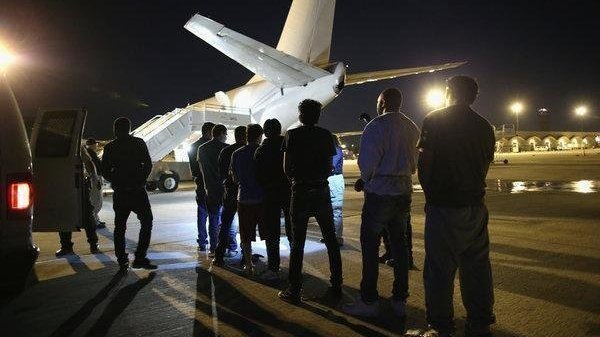Justice Gap reporter, Zaki Sarraf interviewed Daniel (not his real name) currently detained at an immigration removal centre ahead of his scheduled deportation on the Jamaica Charter flight next Wednesday (November 10).
I call Daniel, a 34-year-old Jamaican national as he sat in his cell in Brook House, the Serco-run immigration removal centre near Gatwick airport. Daniel has less than a week until his scheduled deportation on a charter flight to Jamaica – a country he has visited only once in the last 20 years. He arrived in the UK in 2002 when he was 14 years old with his mother. ‘My mum came to the UK in 1992 for a better life for her and her seven kids,’ he tells me. ‘I didn’t have a father growing up, he died when I was young. My mother worked tirelessly for her kids to have a better life.’
‘I don’t know anyone in Jamaica,’ Daniel says. ‘If I am deported, I do not know who I will go to, or who can help me.” Daniel has a serious heart condition. ‘I am getting treatment for by the NHS. Who will supply me with my medication in Jamaica? Deporting me to Jamaica is like throwing a cat into a lion’s den. How do they expect me to survive?’
In Jamaica, Daniel had lived with his eldest sister. ‘Times were tough. My sister tried to take care of me but things were tough. When the time was right, my mother brought me to the UK and I was granted indefinite leave to remain,’ he says. ‘All of my six other siblings also moved away from Jamaica, mostly living in the US with one in the Cayman Islands.’
Daniel has served his almost half of a seven year sentence. He regrets his crime and claims to be rehabilitated. He says: ‘I lived my whole adult life in this country. I am British. I have been in this country for nearly 20 years but I made a mistake. I got caught up with the wrong crowd and now I am in this mess.’
‘I regret my decisions a million times over,’ he says. ‘I got caught up with the wrong crowd and I was convicted of drug charges. With all this time spent locked up, it is clear the impact my actions have had on my family. I put my kids and my mother in this mess. I wouldn’t have got involved with this crowd if I had known the effects of my actions.’ He adds that he would not be about to be deported and depriving his children of a father ‘if I had the right passport colour’.
Daniel’s lawyers see his removal from the UK as ‘part of the Windrush scandal’; but they also point out that Home Office policies are breaking up a family. Daniel has eight children, four boys and four girls. His eldest is 13 and the youngest is two years old. ‘The Home Office continues to deport in the absence of consideration of the best interest of British children,’ comments Shankhanie Samarakoon, a solicitor at David Benson Solicitors. ‘Daniel’s children should not be punished and deprived of the love and affection of a parent because of the parent’s actions. The eight children will be forced to grow up in the absence of a father figure as consequent to the Home Secretary’s wrongdoings.’
The UK government commissions charter flights deporting migrants from the UK en masse as part of its ‘hostile environment’ policies introduced by Theresa May as home secretary in 2012 (reported by the Justice Gap here). At the end of last year the government deported 13 people to Jamaica, down from the 57 who were scheduled to be removed from the UK via a charter flight. The #Jamaica50 scandal shone light on the practice. All those scheduled for deportation had been men; only a handful were taken directly from prison; and many had long since served their sentence, been rehabilitated and were working and raising families.
A flight left for Jamaica from Stansted ay 1.30 in the morning in August with just seven people on board, following 18 legal challenges in the 24 hours before take off. It was originally meant to deport 50 people and lawyers accused it of being ‘an enormous waste of taxpayers’ money’. According to BBC News, a deportation flight costs around £200,000 ‘so returning the handful of passengers to the Caribbean is likely to have cost the Home Office about £30,000 each’. The Home Office said all those on board were convicted criminals with no legal right to remain in the UK.
Campaigners last month warned readers of the Voice newspaper about a new round of deportation flights. ‘Barely two months since Priti Patel signed off on a mass expulsion of black British residents to Jamaica, it appears she is directing officials to start rounding up people for another flight,’ Bella Sankey, director of Detention Action said. ‘People with insecure status may be vulnerable to being deported. People at risk should ensure that they have good legal representation as early as possible so that they can defend their rights.’
‘My kids have been badly affected by my potential deportation. They do not understand it,’ Daniel says. ‘They are always crying and asking when I am coming home. They cry on the phone whenever I speak to them. They ask when I will take them to watch Manchester United play.’
‘Since I have been detained, they have been misbehaving in school – they end up showing up to school late,’ he continues. ‘I used to take them to school. Throughout all of these crazy times, I have thought of giving up on everything… . But then I look at their pictures in my cell and it gives me a purpose to carry on. I travel with their pictures everywhere I go.’
‘All of my kids are British nationals. Why should they grow up without a father because of my mistake?’ Daniel says. ‘It was not their fault – they should not be punished’ ‘The idea of being sent far away from them rips me apart.’
Daniel reports that his sister had to break the news of his deportation to his mother. ‘It broke her,’ he says. ‘My sister told me that our mother broke down crying. She worried where I would live in Jamaica, what would happen to my kids.’
Home Secretary Priti Patel characterises scheduled deportees as ‘foreign criminals’. ‘Priti uses the strongest possible words to try to paint everyone she wants to deport as a serious criminal,’ he says. ‘Not everyone she tries to deport are serious criminals – people are sometimes just in the wrong place at the wrong time or get caught up with the wrong crowd.’
‘She doesn’t understand my experience – if she sat down and actually spoke with me, she would know that I am not a serious criminal. I don’t understand how she can send me to Jamaica – I learnt everything in the UK. The wrong crowd that I followed was here, in the UK. I do not understand the logic of being called “a foreign criminal”.’







